A Detailed Report on Project Management Methodologies & Processes
VerifiedAdded on 2023/06/10
|5
|1089
|308
Report
AI Summary
This report provides a detailed overview of project management methodologies and processes, defining methodology and its role in project management. It discusses various methodologies such as PMBOK, PRINCE2, SDLC, Waterfall, and Agile, highlighting their key features, similarities, and differences. The report also examines the relationship between project methodologies and the project lifecycle, emphasizing the applicability of different methodologies based on project requirements and the need for flexibility. It concludes by referencing relevant sources that support the analysis of project management methodologies and their impact on project success.
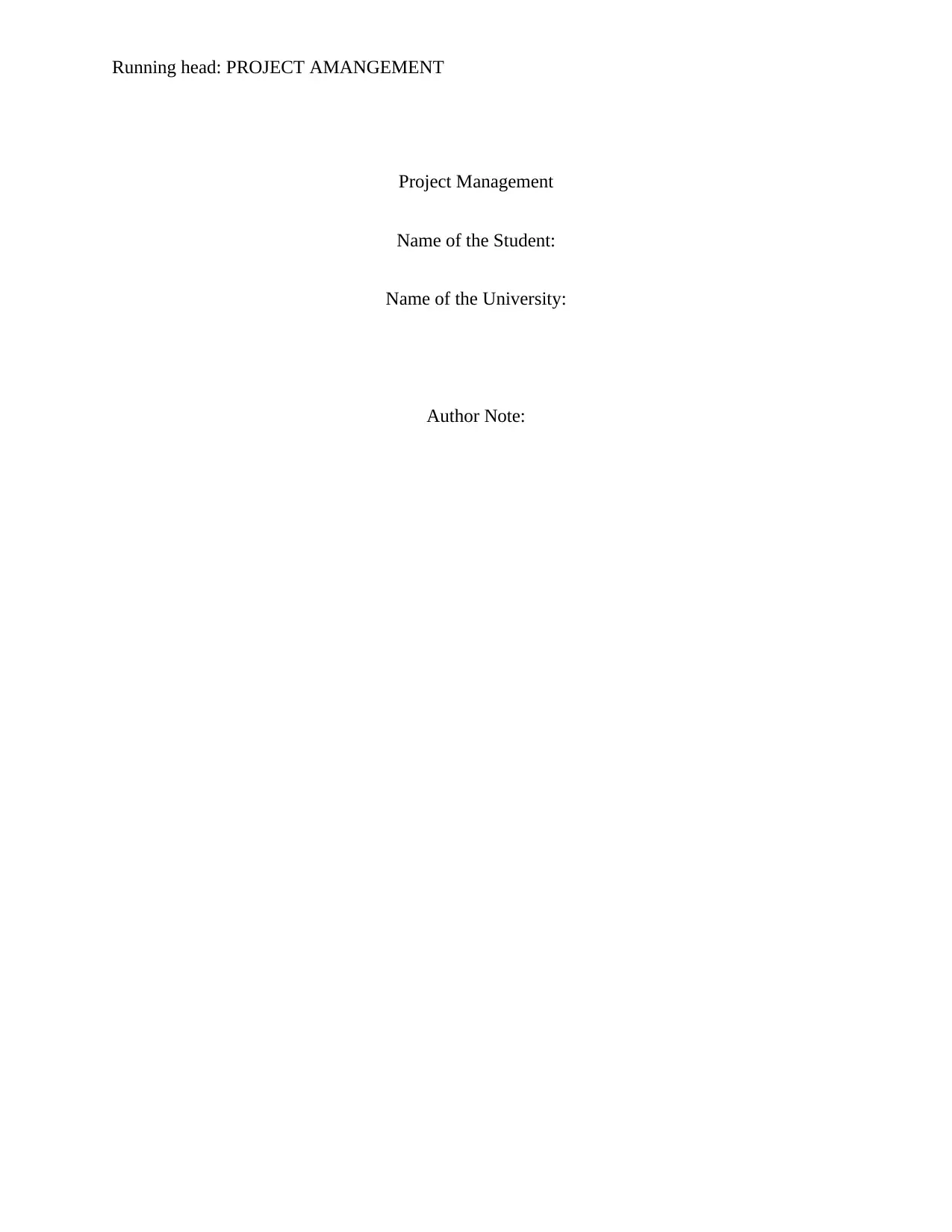
Running head: PROJECT AMANGEMENT
Project Management
Name of the Student:
Name of the University:
Author Note:
Project Management
Name of the Student:
Name of the University:
Author Note:
Paraphrase This Document
Need a fresh take? Get an instant paraphrase of this document with our AI Paraphraser
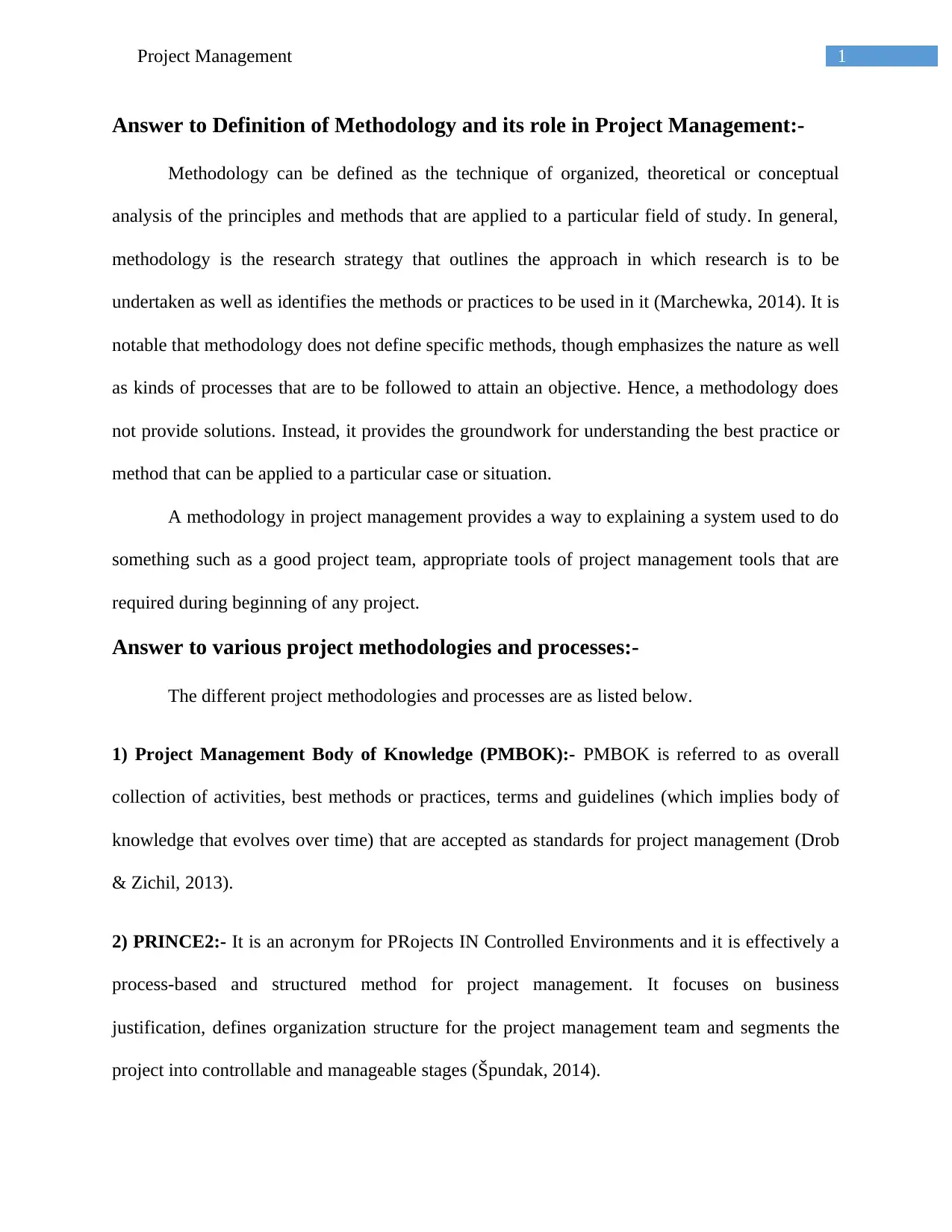
Project Management 1
Answer to Definition of Methodology and its role in Project Management:-
Methodology can be defined as the technique of organized, theoretical or conceptual
analysis of the principles and methods that are applied to a particular field of study. In general,
methodology is the research strategy that outlines the approach in which research is to be
undertaken as well as identifies the methods or practices to be used in it (Marchewka, 2014). It is
notable that methodology does not define specific methods, though emphasizes the nature as well
as kinds of processes that are to be followed to attain an objective. Hence, a methodology does
not provide solutions. Instead, it provides the groundwork for understanding the best practice or
method that can be applied to a particular case or situation.
A methodology in project management provides a way to explaining a system used to do
something such as a good project team, appropriate tools of project management tools that are
required during beginning of any project.
Answer to various project methodologies and processes:-
The different project methodologies and processes are as listed below.
1) Project Management Body of Knowledge (PMBOK):- PMBOK is referred to as overall
collection of activities, best methods or practices, terms and guidelines (which implies body of
knowledge that evolves over time) that are accepted as standards for project management (Drob
& Zichil, 2013).
2) PRINCE2:- It is an acronym for PRojects IN Controlled Environments and it is effectively a
process-based and structured method for project management. It focuses on business
justification, defines organization structure for the project management team and segments the
project into controllable and manageable stages (Špundak, 2014).
Answer to Definition of Methodology and its role in Project Management:-
Methodology can be defined as the technique of organized, theoretical or conceptual
analysis of the principles and methods that are applied to a particular field of study. In general,
methodology is the research strategy that outlines the approach in which research is to be
undertaken as well as identifies the methods or practices to be used in it (Marchewka, 2014). It is
notable that methodology does not define specific methods, though emphasizes the nature as well
as kinds of processes that are to be followed to attain an objective. Hence, a methodology does
not provide solutions. Instead, it provides the groundwork for understanding the best practice or
method that can be applied to a particular case or situation.
A methodology in project management provides a way to explaining a system used to do
something such as a good project team, appropriate tools of project management tools that are
required during beginning of any project.
Answer to various project methodologies and processes:-
The different project methodologies and processes are as listed below.
1) Project Management Body of Knowledge (PMBOK):- PMBOK is referred to as overall
collection of activities, best methods or practices, terms and guidelines (which implies body of
knowledge that evolves over time) that are accepted as standards for project management (Drob
& Zichil, 2013).
2) PRINCE2:- It is an acronym for PRojects IN Controlled Environments and it is effectively a
process-based and structured method for project management. It focuses on business
justification, defines organization structure for the project management team and segments the
project into controllable and manageable stages (Špundak, 2014).
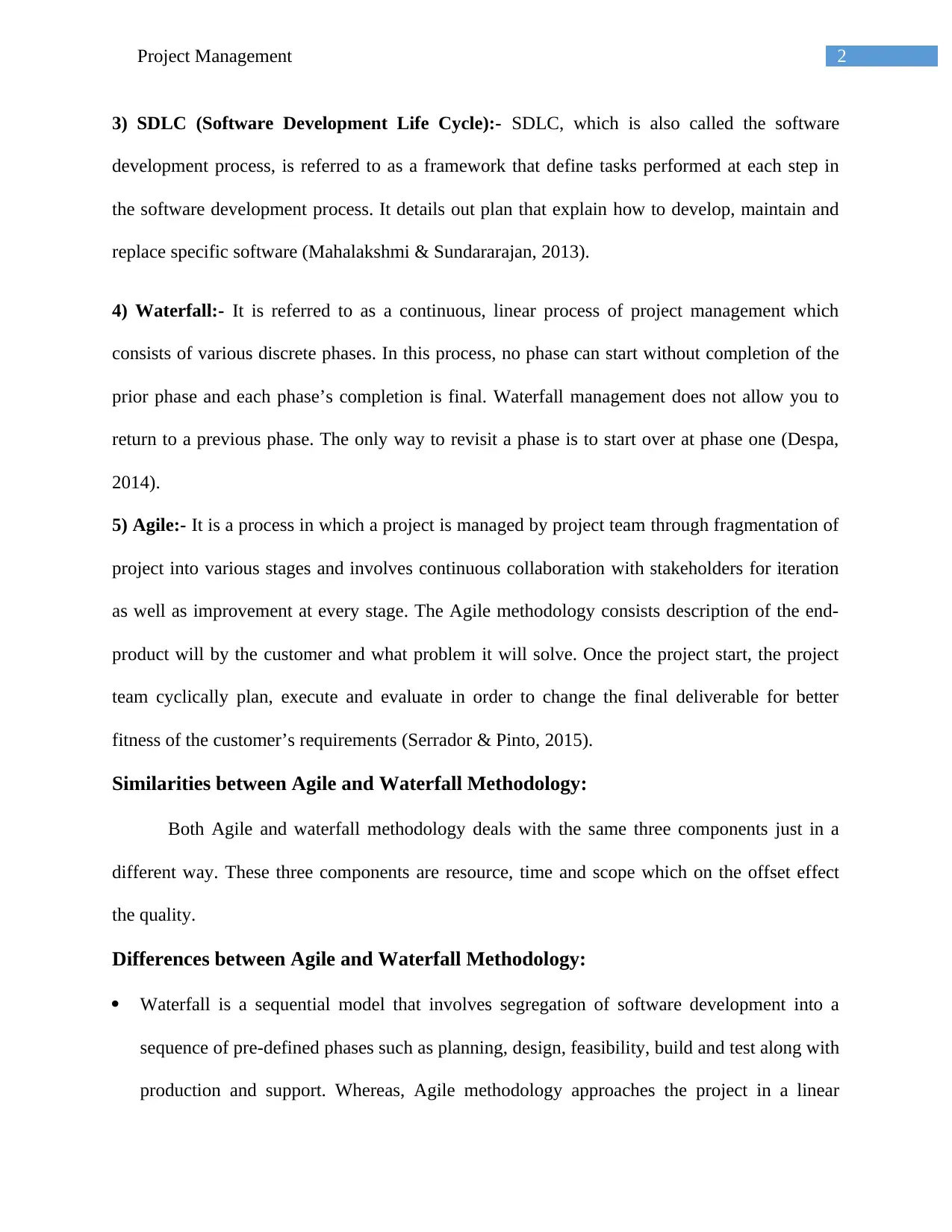
Project Management 2
3) SDLC (Software Development Life Cycle):- SDLC, which is also called the software
development process, is referred to as a framework that define tasks performed at each step in
the software development process. It details out plan that explain how to develop, maintain and
replace specific software (Mahalakshmi & Sundararajan, 2013).
4) Waterfall:- It is referred to as a continuous, linear process of project management which
consists of various discrete phases. In this process, no phase can start without completion of the
prior phase and each phase’s completion is final. Waterfall management does not allow you to
return to a previous phase. The only way to revisit a phase is to start over at phase one (Despa,
2014).
5) Agile:- It is a process in which a project is managed by project team through fragmentation of
project into various stages and involves continuous collaboration with stakeholders for iteration
as well as improvement at every stage. The Agile methodology consists description of the end-
product will by the customer and what problem it will solve. Once the project start, the project
team cyclically plan, execute and evaluate in order to change the final deliverable for better
fitness of the customer’s requirements (Serrador & Pinto, 2015).
Similarities between Agile and Waterfall Methodology:
Both Agile and waterfall methodology deals with the same three components just in a
different way. These three components are resource, time and scope which on the offset effect
the quality.
Differences between Agile and Waterfall Methodology:
Waterfall is a sequential model that involves segregation of software development into a
sequence of pre-defined phases such as planning, design, feasibility, build and test along with
production and support. Whereas, Agile methodology approaches the project in a linear
3) SDLC (Software Development Life Cycle):- SDLC, which is also called the software
development process, is referred to as a framework that define tasks performed at each step in
the software development process. It details out plan that explain how to develop, maintain and
replace specific software (Mahalakshmi & Sundararajan, 2013).
4) Waterfall:- It is referred to as a continuous, linear process of project management which
consists of various discrete phases. In this process, no phase can start without completion of the
prior phase and each phase’s completion is final. Waterfall management does not allow you to
return to a previous phase. The only way to revisit a phase is to start over at phase one (Despa,
2014).
5) Agile:- It is a process in which a project is managed by project team through fragmentation of
project into various stages and involves continuous collaboration with stakeholders for iteration
as well as improvement at every stage. The Agile methodology consists description of the end-
product will by the customer and what problem it will solve. Once the project start, the project
team cyclically plan, execute and evaluate in order to change the final deliverable for better
fitness of the customer’s requirements (Serrador & Pinto, 2015).
Similarities between Agile and Waterfall Methodology:
Both Agile and waterfall methodology deals with the same three components just in a
different way. These three components are resource, time and scope which on the offset effect
the quality.
Differences between Agile and Waterfall Methodology:
Waterfall is a sequential model that involves segregation of software development into a
sequence of pre-defined phases such as planning, design, feasibility, build and test along with
production and support. Whereas, Agile methodology approaches the project in a linear
⊘ This is a preview!⊘
Do you want full access?
Subscribe today to unlock all pages.

Trusted by 1+ million students worldwide
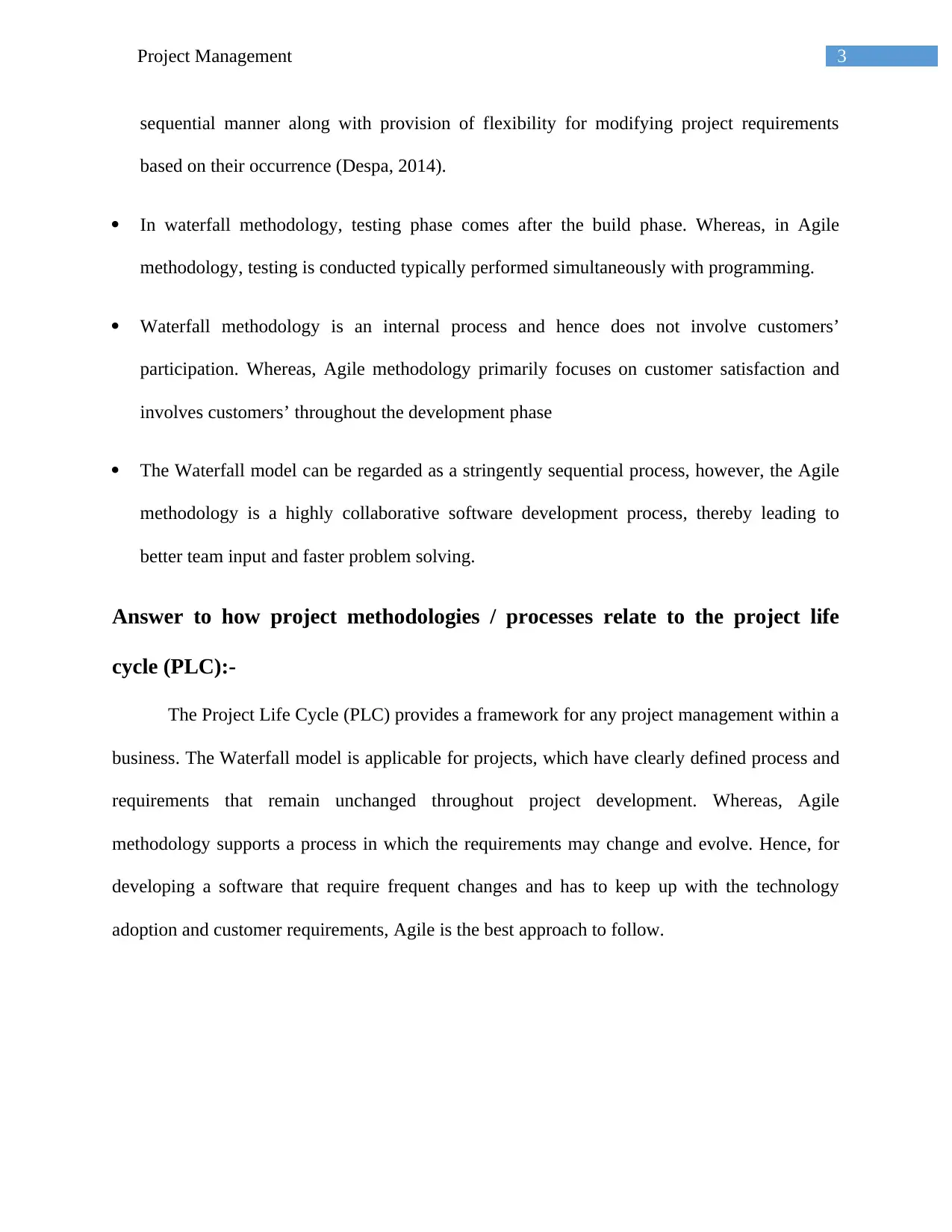
Project Management 3
sequential manner along with provision of flexibility for modifying project requirements
based on their occurrence (Despa, 2014).
In waterfall methodology, testing phase comes after the build phase. Whereas, in Agile
methodology, testing is conducted typically performed simultaneously with programming.
Waterfall methodology is an internal process and hence does not involve customers’
participation. Whereas, Agile methodology primarily focuses on customer satisfaction and
involves customers’ throughout the development phase
The Waterfall model can be regarded as a stringently sequential process, however, the Agile
methodology is a highly collaborative software development process, thereby leading to
better team input and faster problem solving.
Answer to how project methodologies / processes relate to the project life
cycle (PLC):-
The Project Life Cycle (PLC) provides a framework for any project management within a
business. The Waterfall model is applicable for projects, which have clearly defined process and
requirements that remain unchanged throughout project development. Whereas, Agile
methodology supports a process in which the requirements may change and evolve. Hence, for
developing a software that require frequent changes and has to keep up with the technology
adoption and customer requirements, Agile is the best approach to follow.
sequential manner along with provision of flexibility for modifying project requirements
based on their occurrence (Despa, 2014).
In waterfall methodology, testing phase comes after the build phase. Whereas, in Agile
methodology, testing is conducted typically performed simultaneously with programming.
Waterfall methodology is an internal process and hence does not involve customers’
participation. Whereas, Agile methodology primarily focuses on customer satisfaction and
involves customers’ throughout the development phase
The Waterfall model can be regarded as a stringently sequential process, however, the Agile
methodology is a highly collaborative software development process, thereby leading to
better team input and faster problem solving.
Answer to how project methodologies / processes relate to the project life
cycle (PLC):-
The Project Life Cycle (PLC) provides a framework for any project management within a
business. The Waterfall model is applicable for projects, which have clearly defined process and
requirements that remain unchanged throughout project development. Whereas, Agile
methodology supports a process in which the requirements may change and evolve. Hence, for
developing a software that require frequent changes and has to keep up with the technology
adoption and customer requirements, Agile is the best approach to follow.
Paraphrase This Document
Need a fresh take? Get an instant paraphrase of this document with our AI Paraphraser
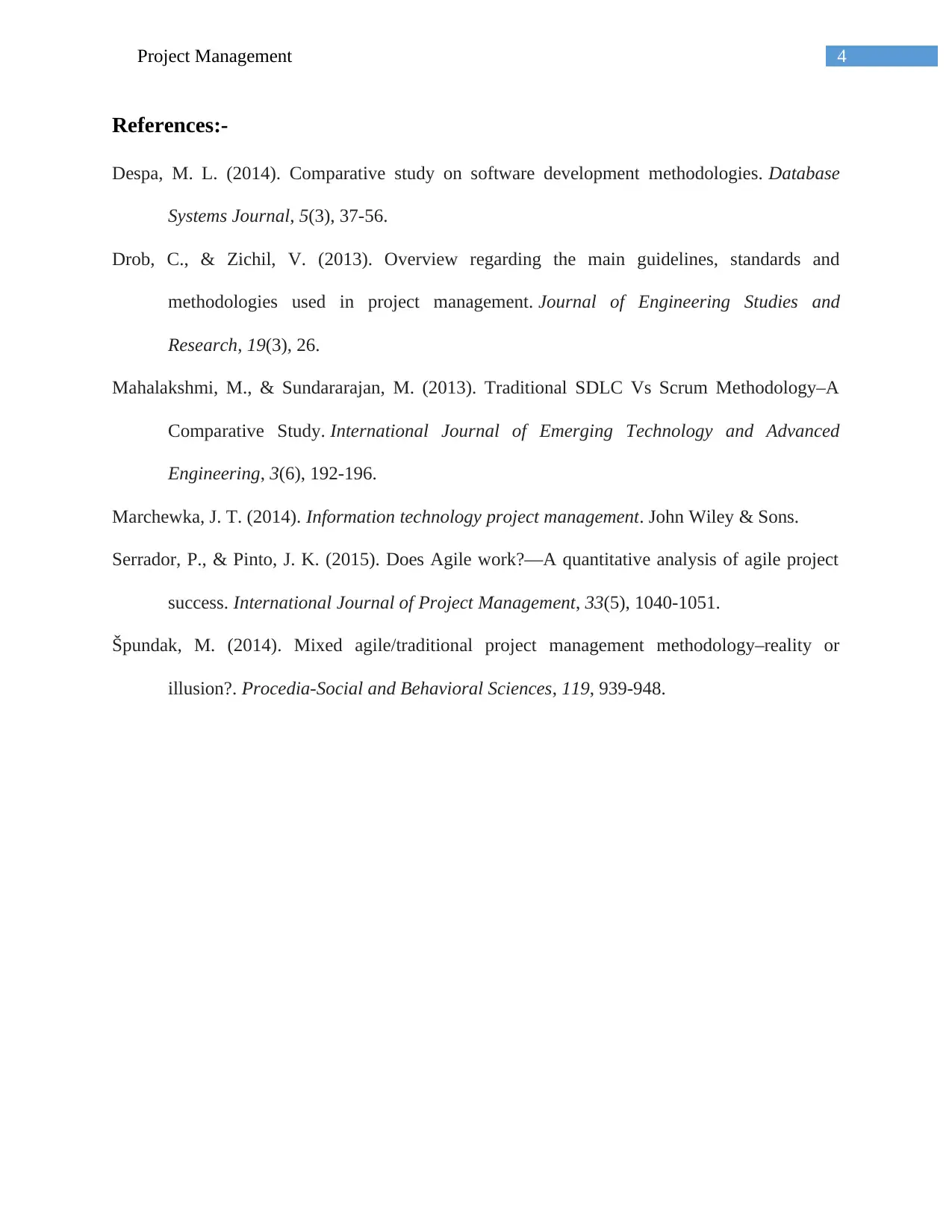
Project Management 4
References:-
Despa, M. L. (2014). Comparative study on software development methodologies. Database
Systems Journal, 5(3), 37-56.
Drob, C., & Zichil, V. (2013). Overview regarding the main guidelines, standards and
methodologies used in project management. Journal of Engineering Studies and
Research, 19(3), 26.
Mahalakshmi, M., & Sundararajan, M. (2013). Traditional SDLC Vs Scrum Methodology–A
Comparative Study. International Journal of Emerging Technology and Advanced
Engineering, 3(6), 192-196.
Marchewka, J. T. (2014). Information technology project management. John Wiley & Sons.
Serrador, P., & Pinto, J. K. (2015). Does Agile work?—A quantitative analysis of agile project
success. International Journal of Project Management, 33(5), 1040-1051.
Špundak, M. (2014). Mixed agile/traditional project management methodology–reality or
illusion?. Procedia-Social and Behavioral Sciences, 119, 939-948.
References:-
Despa, M. L. (2014). Comparative study on software development methodologies. Database
Systems Journal, 5(3), 37-56.
Drob, C., & Zichil, V. (2013). Overview regarding the main guidelines, standards and
methodologies used in project management. Journal of Engineering Studies and
Research, 19(3), 26.
Mahalakshmi, M., & Sundararajan, M. (2013). Traditional SDLC Vs Scrum Methodology–A
Comparative Study. International Journal of Emerging Technology and Advanced
Engineering, 3(6), 192-196.
Marchewka, J. T. (2014). Information technology project management. John Wiley & Sons.
Serrador, P., & Pinto, J. K. (2015). Does Agile work?—A quantitative analysis of agile project
success. International Journal of Project Management, 33(5), 1040-1051.
Špundak, M. (2014). Mixed agile/traditional project management methodology–reality or
illusion?. Procedia-Social and Behavioral Sciences, 119, 939-948.
1 out of 5
Related Documents
Your All-in-One AI-Powered Toolkit for Academic Success.
+13062052269
info@desklib.com
Available 24*7 on WhatsApp / Email
![[object Object]](/_next/static/media/star-bottom.7253800d.svg)
Unlock your academic potential
Copyright © 2020–2026 A2Z Services. All Rights Reserved. Developed and managed by ZUCOL.



